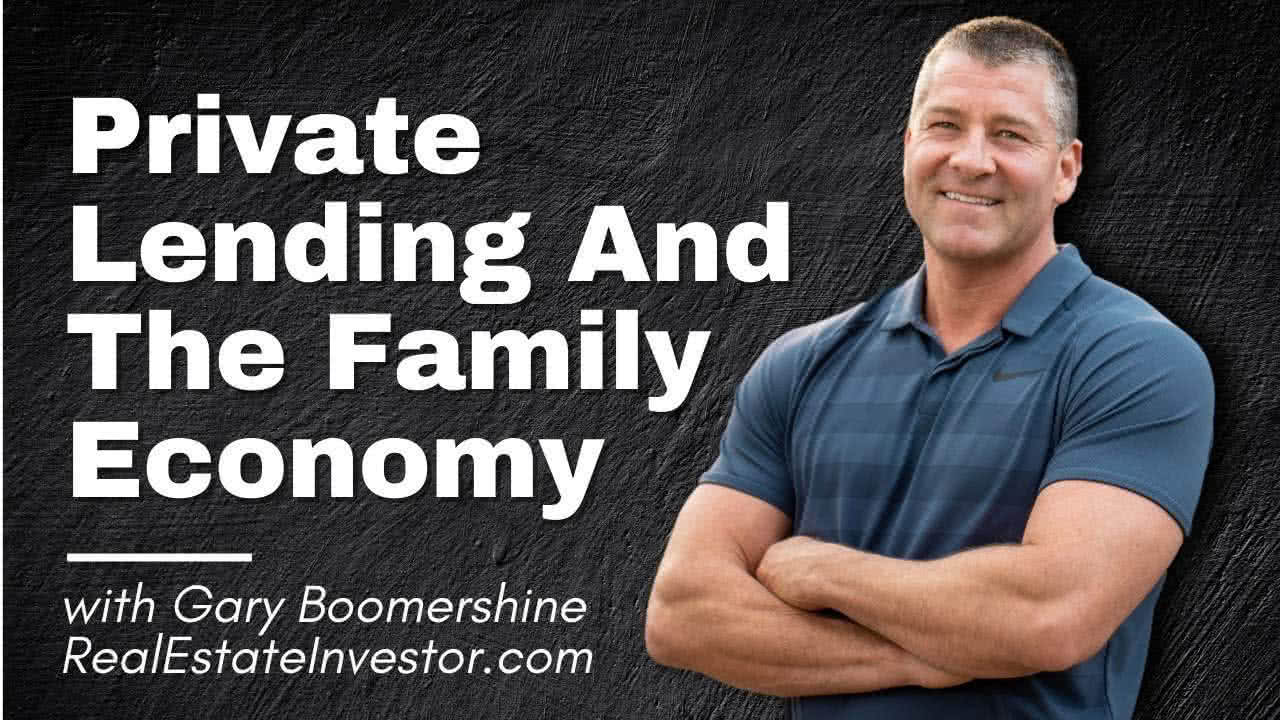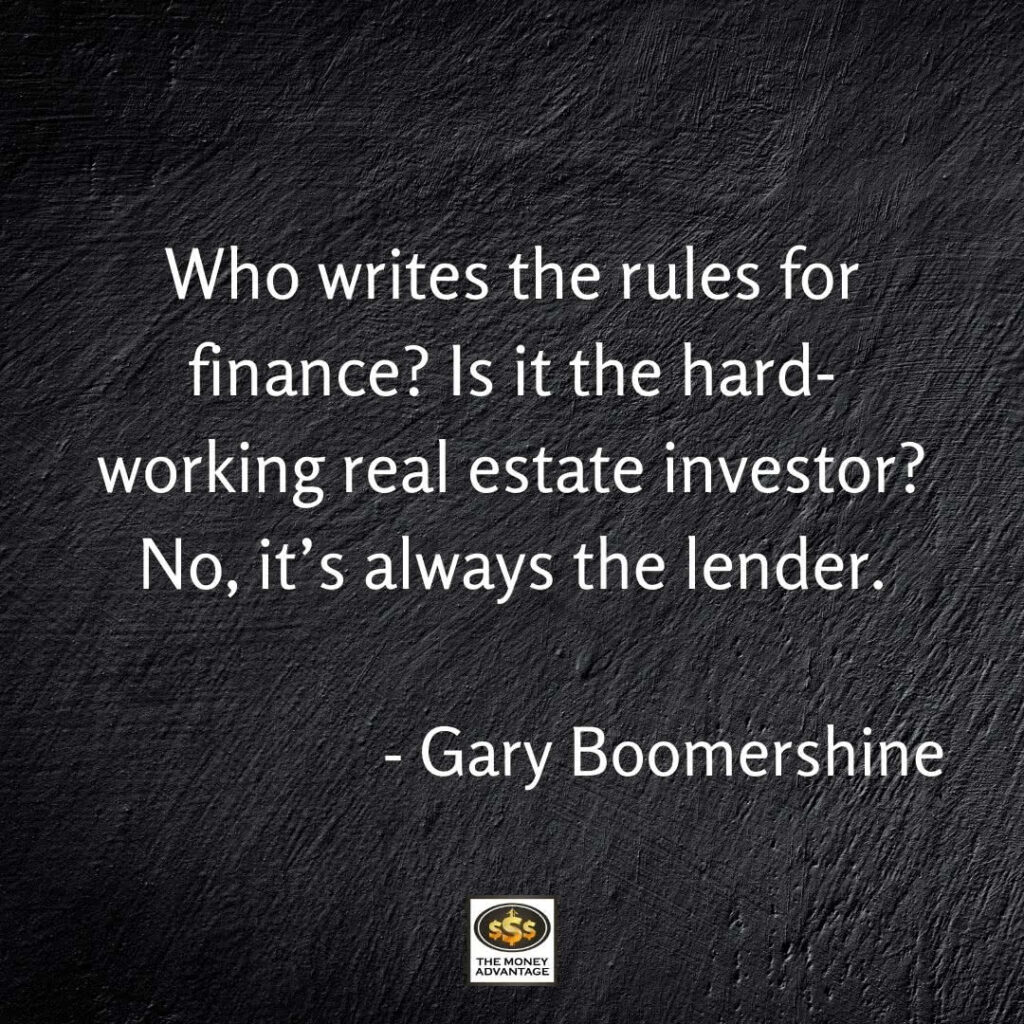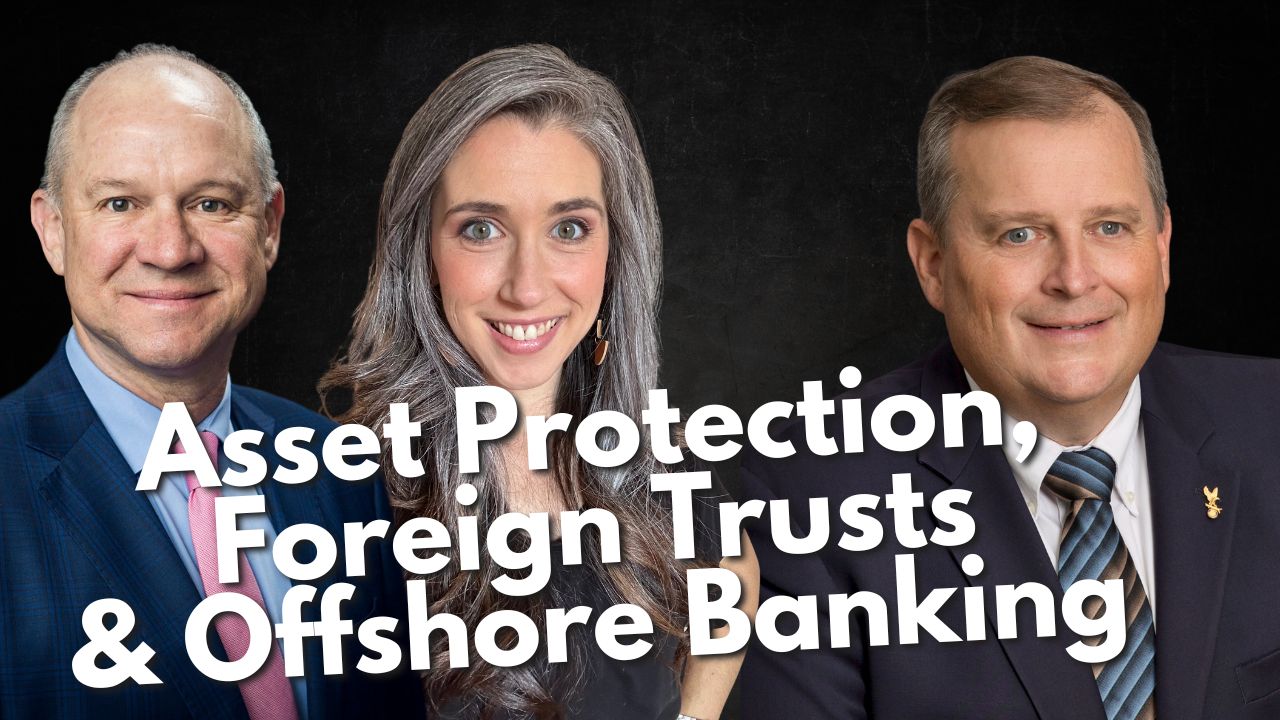
Private Lending for Real Estate, with Gary Boomershine
Want to raise children with responsibility and teach them how to become contributors? Looking for ways to make your capital work harder? Today, we’re talking with Gary Boomershine, CEO of RealEstateInvestor.com about creating a family economy and private lending for real estate.
If you’re an investor or business owner who wants to create the life you envision… tune in now!
Podcast: Play in new window | Download (Duration: 1:05:54 — 75.4MB)
Subscribe: Apple Podcasts | Spotify | Android | Pandora | RSS | More
Table of contents
What is Private Lending?
[2:31] “If we look at…the biggest buildings on every street corner in the world, they’re not rehabbers or real estate companies. Okay, you’ve got a few of them. But you’re not going to see a flipper or a rehabber. The biggest buildings on every street corner, in every part of the world, are banks. Why? Because their business model works.”
Gary points out that many people see a bank, and only really view it as a natural part of their money cycle. They don’t fully understand the concept of banking, and how it is one of the most profitable business models. He points out that the population has been trained to be a cog in the banking system, without questioning it.
Yet, he also says this:
[3:25] “It’s really easy to vilify the banks. But…you know what? The business model works. How can we look at things and act like a banker?”
This is the foundation of private lending.
Real Estate Professionals Need Capital
No matter which way you slice it, capital is necessary for real estate investors. They can come up with the cash themselves, or they can leverage other people’s money to make the sale. Typically, this is when investors visit the banker for a loan.
[5:50] “Who writes the rules for finance? Is it the hard-working real estate investor? No, it’s always the lender.”
If the bank is the lender, they want to see your credit and tie up all your assets in collateral. They also likely want a down payment. Then, once the investor secures the property, who gets paid first? The bank. Banks almost view investors as employees—they’re doing all the heavy lifting and bringing business deals straight to the bank.
And there is tremendous opportunity in becoming like a bank and loaning your capital to other investors if you have the right vehicle to do so. In other words, you also want to leverage other people’s money, like that of a life insurance company.
The Basics of Private Lending
Gary’s first lesson of private lending is that he doesn’t go directly to borrowers. Instead, he goes to a hard money broker or private money broker. That way they can bring him the deal flows. The brokers talk to borrowers and handle the paperwork, as well as vetting properties. These are licensed brokers. Then, all Gary needs to do is wire the money and he gets a deed of trust (rather than a deed).
[8:25] “Private money lenders typically don’t use their own money. They’re using people like us. So if you have an infinite banking system, or if you have cash sitting in a bank account, [you] can go put that to work.”
In such deals, Gary prefers to be lending in the first position (as opposed to the second position), because there is less risk. This way, the loan is secured by a piece of real estate, and he gets a fixed interest rate.
[9:05] “I’m usually getting anywhere between eight and a half percent, and sometimes as high as ten percent. Some people can get higher than that.”
He also requests a 30% down payment, which mitigates much of the risk in the event that the housing market goes downhill or the borrower defaults.
The One Requirement for Private Lending for Real Estate
The one requirement for private lending, as Gary puts it, is capital. A minimum benchmark to start lending would be $100,000 to $200,000. While investing in real estate gives you an opportunity to technically make money out of thin air, you do need money to be a lender. You can’t be the bank if you haven’t built the capital.
The Importance of the Down Payment
In private lending, the down payment is extremely important. Because without the downpayment, your risk can increase tenfold. If the person you’re lending to defaults, or the market goes sideways, you’ll be in the hole. Receiving a large down payment, on the other hand, might just give you the property free and clear in a bad market.
You might have a slightly lower return this way, however, you’ve significantly reduced your risk. You’ll be in a safer position, which is wise in the current real estate market.
How Do You Get Into Private Lending for Real Estate?

[25:30] “A lot of people are like, ‘How do I get into it?’ It’s not hard to learn, but there are some rules.”
Rule 1: Think Like a Banker
The main rule is that you want to approach your investments the way the bank would approach them. As Gary puts it, banks are always looking at the downside of deals, while investors tend to look at the upsides.
Looking at the downside is just going to help you avoid unnecessary risk with the money you lend out.
Rule 2: Have Your Own Criteria
The second rule is to establish your own lending criteria. In other words, the pieces of a deal that must be there in order for you to do business. Banks have criteria such as a certain credit score, or a certain debt to income ratio. It’s important you know your own lending criteria.
[26:05] “I think one of the most important things, as a lender, is you want to know what your criteria is, and never break the rules. So for instance, one of my rules [is that] I only invest in the first position right now…The second is I want a sizeable down payment. I want skin in the game from the borrower.”
He shares that ten years ago, that down payment didn’t need to be 30%. They could actually be pretty successful with a 10% down payment. In the current real estate market, however, it’s better to be conservative. Sometimes Gary even wants a 40% to 60% down payment.
Gary’s other criteria is to only work with secured loans. A promissory note and a deed of trust are essential to him when lending money. Another word to the wise: make sure that the deed of trust has a lender’s insurance policy on it. That way if an insurance claim is filed, such as a house fire, you’re the first to get paid.
Rule 3: Leave the Paperwork to the Professionals
The final “rule” of private lending is to never fill out the paperwork yourself. It’s better to have a licensed broker or an attorney do the paperwork, because of usury laws and other legalities. Charging a fee to do the paperwork yourself might seem like an opportunity, however, Gary calls it a huge opportunity for risk. It’s better to entrust the paperwork to someone who knows the letter of the law.
This also applies to payments. Wiring payments to the broker or attorney and allowing them to disburse funds keeps your money safe. You do not want to wire money directly to the borrower, under any circumstance. Follow the legal process, and everyone is protected.
Private Lending and the Family Economy
Gary’s advice to his children has been to find something they’re passionate about and uniquely gifted for. Yet that doesn’t always pay the bills. So something like real estate investing is unique in that it is one method of providing cash-flowing income to support one’s passion. For example, Gary’s daughter has a big heart and wants to be a nurse in some capacity, and use real estate for additional income.
This is where the “family economy” comes into play.
[52:50] “As an example, we closed on a property—it’s an Airbnb. She’s learned the whole process, she’s involved—we’re having some work done to it… and she’s driving and project managing. And then she’s going to be running the Airbnb. She’ll learn that, and she’ll get good at it… with the goal on the next property she’s going to be part owner.”
So rather than giving his daughter the money directly, Gary is partnering with his daughter, with a goal that over the next seven years she’ll acquire five properties for passive income. They’ve also created a plan for her to buy a property that she can then rent out to friends and live in without rent, so she can build equity and repeat the process.
Leveraging You Family’s Skills
Another of Gary’s daughters is passionate about social media and is extremely savvy in that area. So he’s hired her in the company to help with social media, so he can directly encourage and reward her passion and skills—rather than hiring someone on the outside.
Gary’s in-laws are also a part of the family economy and help with real estate investing. So all members of the family are working within this family system, doing what they’re uniquely suited to do. Everyone in the family, then, benefits from this family economy and learns practical skills in the process.
Ultimately, Gary’s family economy system is centered around the question: How can we best use the resources within our family?
Connect with Gary
- Business Growth Toolbox (Sign up to get special access to his latest book, The Freedom Code, when it releases.)
- Real Estate Investor
- The Real Estate Investor Huddle
About Gary Boomershine
Gary Boomershine founded RealEstateInvestor.com in 2005 out of the need to scale and grow his own real estate investing and home buying business. With a family legacy in the real estate niche and a long successful career in enterprise and emerging technology markets, Gary saw the vision for RealEstateInvestor.com. He noticed the glaring opportunity to leverage people, processes, and technology to gain a leg up in a changing and competitive marketplace. As he worked to develop and use the initial product and service, he saw his real estate business flourish by allowing him to work smarter, not harder, and focus on the one thing that makes money—talking to sellers and making offers. That’s when RealEstateInvestor.com began offering its flagship product, Service Done-For-You, to the savvy investor market.
According to Gary, “Most small real estate enterprises limit their growth and many times fail because they lack real marketing and sales expertise along with the infrastructure to scale their business. Instead of being able to focus on closing deals and maximizing profits, they hit a wall trying to build and do everything themselves; and they simply can’t do it!” RealEstateInvestor.com caters to top producing agents, investors, and smaller hedge funds who are looking for a competitive advantage in their local markets. Under the leadership of Gary Boomershine, this service has launched a “technology revolution” within the real estate niche; offering an alternative to the MLS by bringing pre-screened motivated sellers and buyers face to face at the right time.
Gary currently resides in Northern California with his wife and two daughters, where he continues to manage a global team for RealEstateInvestor.com. He is actively involved in real estate investing and private lending. In his free time, he enjoys fly fishing, skiing, hiking, mountain biking, and traveling with family.
Book A Strategy Call
Do you want to coordinate your finances so that everything works together to improve your life today, accelerate time and money freedom, and leave the greatest legacy? We can help! Book an Introductory Call with our team today https://themoneyadvantage.com/calendar/, and find out how Privatized Banking, alternative investments, or cash flow strategies can help you accomplish your goals better and faster. That being said, if you want to find out more about how Privatized Banking gives you the most safety, liquidity, and growth… plus boosts your investment returns, and guarantees a legacy, go to https://privatizedbankingsecrets.com/freeguide to learn more.
The Power of Trusts for Generational Wealth with Joel Nagel
If you’re reading this, chances are you’ve already taken the first step towards securing your financial future. But what about the financial futures of your children, grandchildren, or even your great-grandchildren? The journey towards financial stability isn’t a one-generation game; it’s about creating a lasting legacy that will provide for your loved ones long after…
Read MoreEstate Planning 101: Protecting Your Loved Ones
Can you confidently say your family’s financial future is protected? Staring down the barrel of a life-altering moment, I was forced to confront the fragility of existence and the critical importance of having one’s affairs in order. That harrowing experience became a catalyst for today’s soul-searching episode of the Money Advantage podcast, where we navigate…
Read More


